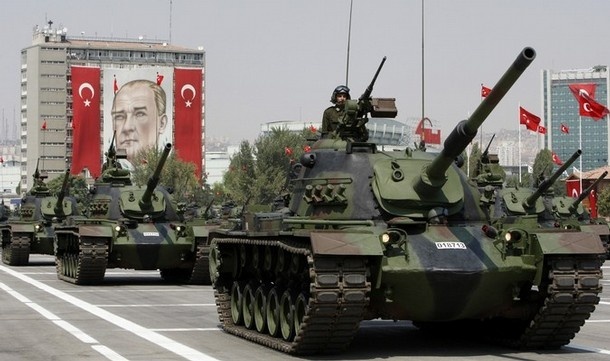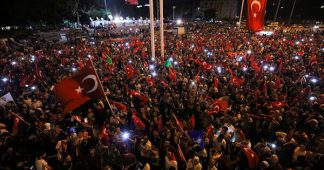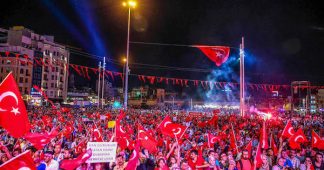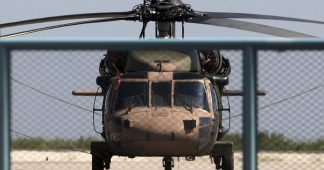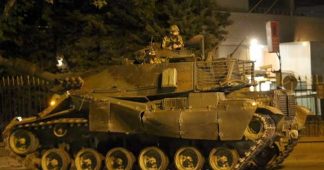Once respected by all western leaders and media, the Turkish President is now recieving the one blow after the other from his (until recently) international friends.
Of course this is due, at least partially, to his own policies and to the situation Turkey is living through. But the present day western system of media, controlled as never before by international Finance, is not as innocent as it wants to present itself. Our great, historic newspapers are a shadow of themselves, as for the public opinion remains under the influence of a dictatorship of TV impressions, used to destroy any system of rational thinking.
We all remember the massive slander campaigns against Greeks, against Yugoslavia, against Saddam or Kaddafi, or the hysterical campaign against Putin – and also where these media campaigns have led. In all the above cases the mainstream western media used some truths and half truths to construct big lies, a method much more effective than the propaganda techniques used by “Pravda”. We also remember also very well the consequences.
We don’t write all this to deny the veracity of the reports about Turkey, an anthology of which follows. The Erdogan regime is obviously guilty of many “sins”. Still one question is if what is written is correct, another, also very important, is why is written.
It is right to speak for example of the links between Turkey and ISIS. But these ties were known long ago. Why they are revealed just now? And why we read much less about the ties of nearly all western powers and their Middl;e Eastern partners.
WILL THERE BE A COUP AGAINST ERDOGAN IN TURKEY?
http://europe.newsweek.com/will-there-be-coup-against-erdogan-turkey-439181?rm=eu
US, Europe Will Show No ‘Sympathy’ to Erdogan in Event of ‘Military Coup
http://sputniknews.com/middleeast/20160325/1036977771/turkey-erdogan-military-coup.html
A Political Comeback for the Turkish Military?
CONCLUSIONS: The Turkish military has no known intention to intervene in the political decision-making process. However, the military has retained a capacity to do so – both by means of its continued role in security policy making and its relative institutional autonomy.
The military remains dedicated to the notion of the unitary state. The military can be expected to become politically more assertive should it perceive that it’s ‘red-lines’ regarding the unitary state principle are being crossed. The extent of any military involvement in politics will therefore largely depend on how the conflict with the PKK develops, and how the Kurdish issue as a whole is handled by the government. However, it is highly unlikely that any such involvement will take the form of a direct intervention; it is more probable that the generals would seek to force the hand of the government, or pressure it not to make concessions to the Kurds, in case such a move were to be contemplated.
Unless the professional interests of the military come under threat, for example in the form of political purges in the officers’ corps similar to those that have already taken place in the police and the judiciary, the military leadership will most likely stick to its non-interventionist line in politics. So far, there have been no real attempts by the government to interfere in the internal affairs of the military. Should there be such an attempt, it will constitute the first real test of how much civil-military relations in Turkey have changed, and how much civilian control and oversight the military leadership is actually willing to accept.
The Sound of Footsteps: Erdogan’s New Enemies Within
CONCLUSIONS: Ever since the Gezi Park Protests that swept the country in summer 2013 there has been a sense that Turkey has entered the final, highly turbulent, stage of the Erdoğan era. The devotees of what has now become an Erdoğan personality cult still insist that he will remain in power until at least 2024 and that, once he has been able to introduce a presidential system, Erdoğan will bring domestic stability and prosperity and elevate Turkey to what they regard as its rightful place as the dominant power in the Middle East. In reality, there appears little prospect of Turkey enjoying sustained stability or prosperity, much less regional preeminence, while Erdoğan remains in office.
But it would be a mistake to regard the situation in Turkey as being static. It is not only deteriorating but doing so rapidly. Erdoğan’s increasingly repressive authoritarianism, his relentlessly aggressive anger, the improbable conspiracy theories that pepper his public pronouncements, the suppression of free speech and the spiraling viciousness of the invective of his loyalists are all redolent not of strength and confidence but of weakness and a growing sense of desperation.
If the situation continues to deteriorate at its current rate it is debatable whether either Turkey or Erdoğan’s health will be able to survive the strain for another two years — much less eight — without suffering severe damage. Indeed, if the current trend continues, a breaking point appears inevitable. But whether Gül and the other dissidents in the AKP have the courage or the ability to halt the slide before it is too late currently both remain unclear.
